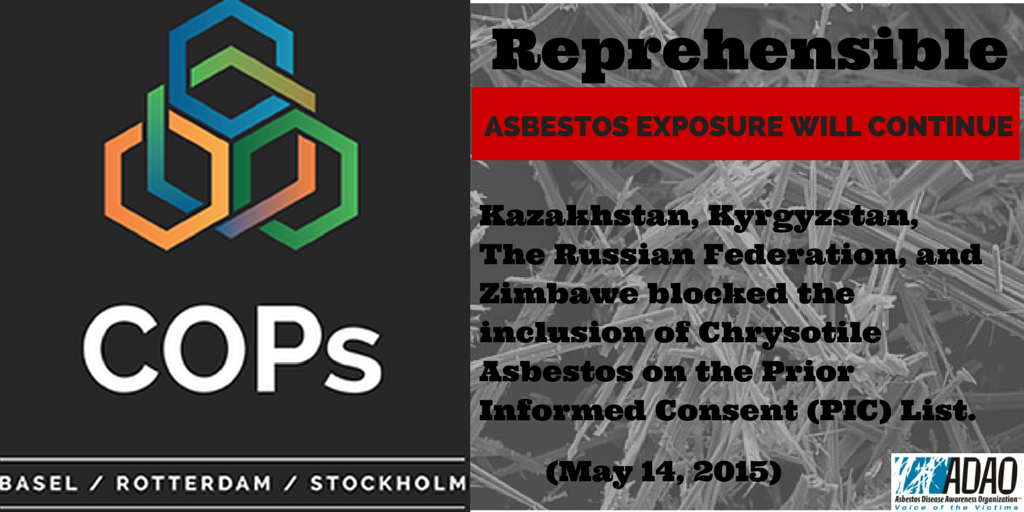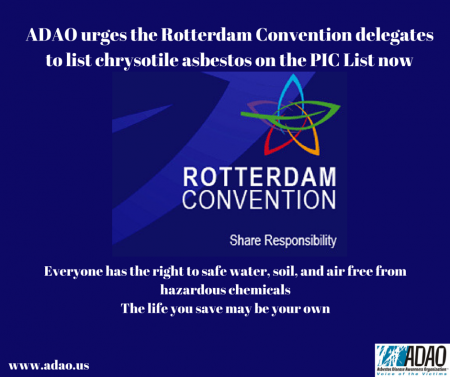Updated on May 15, 2015
 BLOCKED for the 5th time – disappointing, but NOT surprising. Kazakhstan, Kyrgyzstan, The Russian Federation and Zimbabwe blocked the inclusion of Chrysotile Asbestos on the Prior Informed Consent (PIC) List.
BLOCKED for the 5th time – disappointing, but NOT surprising. Kazakhstan, Kyrgyzstan, The Russian Federation and Zimbabwe blocked the inclusion of Chrysotile Asbestos on the Prior Informed Consent (PIC) List.
Updated on May 13, 2015
Reprehensible: ASBESTOS EXPOSURE WILL CONTINUE
Cuba, India, Kazakhstan, Kyrgyzstan, Pakistan, The Russian Federation, and Zimbabwe voted to block the inclusion of Chrysotile Asbestos on the Prior Informed Consent (PIC) List.
Earth Negotiations Bulletin (ENB) reported ,”President Khashashneh reminded parties that listing a chemical does not prohibit trade, but provides countries with relevant information to make informed decisions.”
Earth Negotiations Bulletin (ENB) |
|---|
Volume 15 Number 228 | Thursday, 14 May 2015 |
BRS Conventions COPs Highlights |
Wednesday, 13 May 2015 | Geneva, Switzerland |
|
Visit our IISD/ENB Meeting Coverage from Geneva, Switzerland at: http://www.iisd.ca/chemical/cops/2015/
|
| The meetings of the Conferences of Parties (COPs) to the Basel, Rotterdam and Stockholm (BRS) Conventions continued on Wednesday, 13 May 2015. Delegates reconvened in the morning to hear reports from contact groups. The Rotterdam Convention (RC) COP then met in the morning and afternoon to address issues including listing chemicals in Annex III, strategic issues, and other matters, and decided to list methamidophos in Annex III.Contact groups met throughout the day to address issues including: BC legal matters; technical assistance and financial resources; budget; and listing of chemicals under the RC. A “Friends of the President” group met with BC President Jagusiewicz to discuss a possible way forward on the number of translation days for meetings of the OEWG, an issue within the remit of the BC strategic matters contact group. A “Friends of the Co-Chairs” group met throughout the day on compliance under the RC, and in the late afternoon, the contact group on this issue reconvened.ROTTERDAM CONVENTION COP7Matters related to the implementation of the Convention: Consideration of chemicals for inclusion in Annex III to the Convention: Methamidophos: In the morning, President Khashashneh noted that the decision on methamidophos had been deferred to allow Mexico to consult on the issue. MEXICO announced its support for listing the substance in Annex III. RC COP7 adopted the decision (UNEP/FAO/RC/COP.7/7), pending budgetary approval.Chrysotile asbestos: The Secretariat introduced the documents (UNEP/FAO/RC/COP.7/11 and Add.1), noting this issue had been debated at COPs 3-6, without achieving consensus. President Khashashneh reminded parties that listing a chemical does not prohibit trade, but provides countries with relevant information to make informed decisions.ZIMBABWE, PAKISTAN, KYRGYZSTAN, KAZAKHSTAN, the RUSSIAN FEDERATION and CUBA opposed listing. INDIA also opposed listing, but suggested “controlled use” of chrysotile asbestos. BELARUS, a non-party, opposed listing. The INTERNATIONAL ALLIANCE OF TRADE UNION ORGANIZATIONS “CHRYSOTILE” also opposed listing, arguing instead for controlled use under International Labour Organization (ILO) Convention 162.JORDAN, NEPAL, GEORGIA, BENIN, PERU, COLOMBIA, MALAYSIA, NORWAY, HONDURAS, SERBIA, LIBERIA, NIGERIA, the REPUBLIC OF KOREA, MOLDOVA, SAUDI ARABIA, MALDIVES, ARGENTINA, URUGUAY, DOMINICAN REPUBLIC, NIGER, SWITZERLAND, MONGOLIA, the REPUBLIC OF CONGO, the DEMOCRATIC REPUBLIC OF CONGO, ISRAEL, CAMEROON, KENYA, EQUATORIAL GUINEA, PANAMA, TONGA and EL SALVADOR supported listing. While recognizing the challenges it would pose to specific sectors in its country, BRAZIL said sound scientific evidence on health and environmental impacts had led it to support listing. The US, a non-party, also urged listing.
AUSTRALIA, cited “bitter experience” with health, environmental and economic impacts of chrysotile asbestos long after it had been banned and, supported by NEW ZEALAND, the COOK ISLANDS, SWITZERLAND and TONGA, said it was time to ask if the RC objectives were being met when the only chemicals allowed to be listed are those no longer traded. He introduced a CRP (UNEP/FAO/RC/COP.7/CRP.10) that,inter alia, suggests intersessional work on a possible framework that enables information flows for those substances that meet the listing criteria but remain unlisted. The EU concurred that, if chrysotile asbestos was not listed at RC COP7, it was time for a “frank discussion about the credibility of the RC.” WOMEN IN EUROPE FOR A COMMON FUTURE, on behalf of the ROTTERDAM CONVENTION ALLIANCE (ROCA), said listing was being blocked to protect industry interests. She introduced an Indian worker who, after working with chrysotile asbestos for 40 years, suffers from asbestosis, and who pleaded for listing of the chemical. IPEN asked how developing countries can be expected to cope without information if a developed country like Australia has had problems with this. Noting that he has attended COPs for 15 years and has never heard such participation, RC President Khashashneh proposed, and delegates agreed, to refer it to the listing contact group rather than suspend discussion until RC COP8. President Khashashneh also proposed establishing an intersessional working group composed of parties and observers to explore the means by which the objectives of the RC could be achieved in instances in which the COP is unable to reach consensus on listing of chemicals recommended by the CRC. President Khashashneh tasked the contact group with drafting a decision to establish an intersessional group and work plan, and asked the contact group to consider Australia’s CRP on the operation of the RC (UNEP/FAO/RC/COP.7/CRP.10). |
Posted on May 1, 2015

The UN Rotterdam Convention is a critical piece of the global effort to prevent exposure to toxic chemicals, including asbestos. Join in solidarity. Be heard. Share your message of support by posting pictures, short videos, and messages to the Asbestos Free Future Facebook page here. These messages will be delivered to delegates at the convention broadcasting a “message from the world” to ban chrysotile asbestos.
As this year’s convention approaches in May, we wanted to share the history and purpose of this event with those following the battle against asbestos.
Public and official concern about the potential risks posed by hazardous chemicals and pesticides has existed for decades. In response to these concerns, the United Nations Environment Programme (UNEP) and the Food and Agriculture Organization of the United Nations (FAO) started developing and promoting voluntary information-exchange programmes in the mid 1980’s. FAO launched its International Code of Conduct on the Distribution and Use of Pesticides in 1985 and UNEP set up the London Guidelines for the Exchange of Information on Chemicals in International Trade in 1987. Soon after, officials attending the 1992 Rio Earth Summit called for the adoption of a legally binding instrument on the Prior Informed Consent (PIC) procedure by the year 2000. The group agreed that, while chemicals could potentially be essential to fighting poverty and disease, many were also hazardous to human health. Many of the chemicals that had already been banned by Western countries were still being shipped to developing countries with little understanding of the dangers of these chemicals and a lack of communication on the best practices for how to monitor them. In response to these concerns, officials finalized text for the Convention on the Prior Informed Consent for Certain Hazardous Chemicals in International Trade in March 1998. This was adopted and opened for signatures at a Conference of Plenipotentiaries in Rotterdam in 1998 and then entered into force in early 2004. The first Conference of the Parties to the Rotterdam Convention (COP-1) was held in September 2004.
The UN Rotterdam Convention endeavored to advance responsible trade and environmental justice through sharing responsibilities related to hazardous chemicals and suggesting that all countries have a legal and moral duty to inform on exporting countries while providing the basic human right of PIC to importing countries. Any opposition to the PIC List demonstrates how the global asbestos industry is endangering the integrity and effectiveness of the Rotterdam Convention, in addition to the health and safety of citizens. As a result, countries in transition will continue to import deadly chemicals such as asbestos and, in doing so, expose their own population to their dangers.
Make sure your voice is heard. Send a message to the Rotterdam Convention by posting on the Asbestos Free Future Facebook page here.
The ADAO message to the 2015 delegates is: “ADAO urges the Rotterdam Convention delegates to list chrysotile asbestos on the PIC List now. Everyone has the right to safe water, soil, and air free from hazardous chemicals. The life you save may be your own.”
Enough!
Linda
